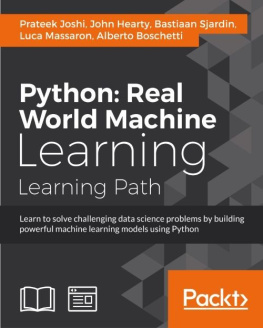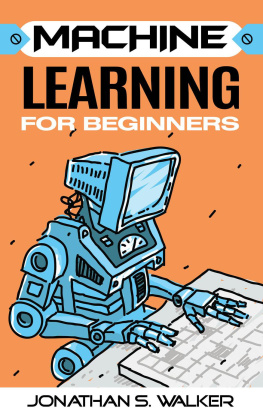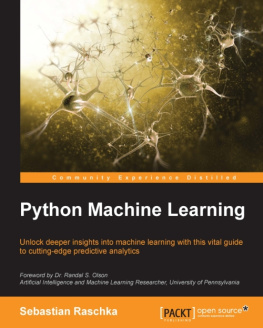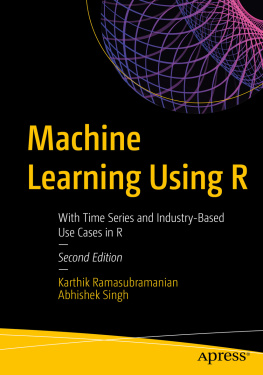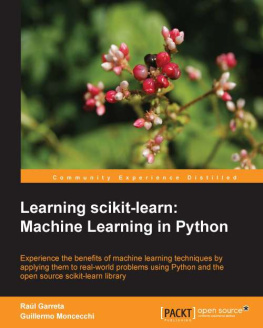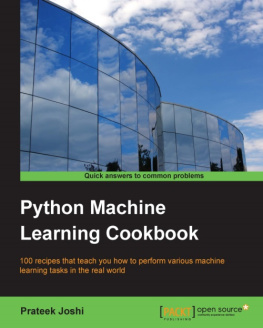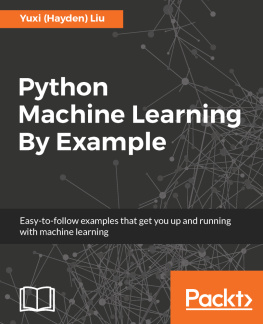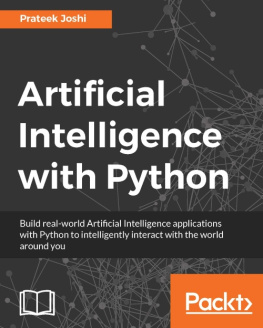Prateek Joshi et al. - Python: Real World Machine Learning
Here you can read online Prateek Joshi et al. - Python: Real World Machine Learning full text of the book (entire story) in english for free. Download pdf and epub, get meaning, cover and reviews about this ebook. year: 2016, publisher: Packt Publishing, genre: Computer. Description of the work, (preface) as well as reviews are available. Best literature library LitArk.com created for fans of good reading and offers a wide selection of genres:
Romance novel
Science fiction
Adventure
Detective
Science
History
Home and family
Prose
Art
Politics
Computer
Non-fiction
Religion
Business
Children
Humor
Choose a favorite category and find really read worthwhile books. Enjoy immersion in the world of imagination, feel the emotions of the characters or learn something new for yourself, make an fascinating discovery.
- Book:Python: Real World Machine Learning
- Author:
- Publisher:Packt Publishing
- Genre:
- Year:2016
- Rating:4 / 5
- Favourites:Add to favourites
- Your mark:
- 80
- 1
- 2
- 3
- 4
- 5
Python: Real World Machine Learning: summary, description and annotation
We offer to read an annotation, description, summary or preface (depends on what the author of the book "Python: Real World Machine Learning" wrote himself). If you haven't found the necessary information about the book — write in the comments, we will try to find it.
Python: Real World Machine Learning — read online for free the complete book (whole text) full work
Below is the text of the book, divided by pages. System saving the place of the last page read, allows you to conveniently read the book "Python: Real World Machine Learning" online for free, without having to search again every time where you left off. Put a bookmark, and you can go to the page where you finished reading at any time.
Font size:
Interval:
Bookmark:
Learn to solve challenging data science problems by building powerful machine learning models using Python
A course in three modules

BIRMINGHAM - MUMBAI
Copyright 2016 Packt Publishing
All rights reserved. No part of this course may be reproduced, stored in a retrieval system, or transmitted in any form or by any means, without the prior written permission of the publisher, except in the case of brief quotations embedded in critical articles or reviews.
Every effort has been made in the preparation of this course to ensure the accuracy of the information presented. However, the information contained in this course is sold without warranty, either express or implied. Neither the authors, nor Packt Publishing, and its dealers and distributors will be held liable for any damages caused or alleged to be caused directly or indirectly by this course.
Packt Publishing has endeavored to provide trademark information about all of the companies and products mentioned in this course by the appropriate use of capitals. However, Packt Publishing cannot guarantee the accuracy of this information.
Published on: October 2016
Published by Packt Publishing Ltd.
Livery Place
35 Livery Street
Birmingham B3 2PB, UK.
ISBN 978-1-78712-321-2
www.packtpub.com
Authors
Prateek Joshi
John Hearty
Bastiaan Sjardin
Luca Massaron
Alberto Boschetti
Reviewers
Dr. Vahid Mirjalili
Jared Huffman
Ashwin Pajankar
Oleg Okun
Kai Londenberg
Content Development Editor
Aishwarya Pandere
Production Coordinator
Nilesh Mohite
Machine learning is becoming increasingly pervasive in the modern data-driven world. It is used extensively across many fields, such as search engines, robotics, self-driving cars, and so on. In this course, you will explore various real-life scenarios where you can use machine learning. You will understand what algorithms you should use in a given context using this exciting recipe-based guide.
This course starts by talking about various realms in machine learning followed by practical examples.
, Python Machine Learning Cookbook , teaches you about the algorithms that we use to build recommendation engines. We will learn how to apply these algorithms to collaborative filtering and movie recommendations.
, Advanced Machine Learning with Python , explains how to apply several semi-supervised learning techniques including CPLE, self learning, and S3VM.
, Large Scale Machine Learning with Python , covers interesting deep learning techniques together with an online method for neural networks. Although TensorFlow is only in its infancy, the framework provides elegant machine learning solutions.
Module 1: While we believe that the world is moving forward with better versions coming out, a lot of developers still enjoy using Python 2.x. A lot of operating systems have Python 2.x built into them. This course is focused on machine learning in Python as opposed to Python itself. It also helps in maintaining compatibility with libraries that havent been ported to Python 3.x. Hence the code in the book is oriented towards Python 2.x. In that spirit, we have tried to keep all the code as agnostic as possible to the Python versions.
Module 2: The entirety of this courses content leverages openly available data and code,including open source Python libraries and frameworks. While each chapters example code is accompanied by a README file documenting all the libraries required to run the code provided in that chapters accompanying scripts, the content of these files is collated here for your convenience. It is recommended that some libraries required for earlier chapters be available when working with code from any later chapter. These requirements are identified using bold text. Particularly, it is important to set up the first chapters required libraries for any content later in the book.
Module 3: The execution of the code examples provided in this book requires an installation of Python 2.7 or higher versions on macOS, Linux, or Microsoft Windows.
The examples throughout the book will make frequent use of Pythons essential libraries, such as SciPy, NumPy, Scikit-learn, and StatsModels, and to a minor extent, matplotlib and pandas, for scientific and statistical computing. We will also make use of an out-of-core cloud computing application called H2O. This book is highly dependent on Jupyter and its Notebooks powered by the Python kernel. We will use its most recent version, 4.1, for this book. The first chapter will provide you with all the step-by-step instructions and some useful tips to set up your Python environment, these core libraries, and all the necessary tools.
This Learning Path is for Python programmers who are looking to use machine learning algorithms to create real-world applications. Python professionals intending to work with large and complex datasets and Python developers and analysts or data scientists who are looking to add to their existing skills by accessing some of the most powerful recent trends in data science will find this Learning Path useful. Experience with Python, Jupyter Notebooks, and command-line execution together with a good level of mathematical knowledge to understand the concepts is expected. Machine learning basics is also expected.
Feedback from our readers is always welcome. Let us know what you think about this coursewhat you liked or disliked. Reader feedback is important for us as it helps us develop titles that you will really get the most out of.
To send us general feedback, simply e-mail <>, and mention the courses title in the subject of your message.
If there is a topic that you have expertise in and you are interested in either writing or contributing to a book, see our author guide at www.packtpub.com/authors.
Now that you are the proud owner of a Packt course, we have a number of things to help you to get the most from your purchase.
You can download the example code files for this course from your account at http://www.packtpub.com. If you purchased this course elsewhere, you can visit http://www.packtpub.com/support and register to have the files e-mailed directly to you.
You can download the code files by following these steps:
- Log in or register to our website using your e-mail address and password.
- Hover the mouse pointer on the SUPPORT tab at the top.
- Click on Code Downloads & Errata .
- Enter the name of the course in the Search box.
- Select the course for which youre looking to download the code files.
- Choose from the drop-down menu where you purchased this course from.
- Click on Code Download .
Font size:
Interval:
Bookmark:
Similar books «Python: Real World Machine Learning»
Look at similar books to Python: Real World Machine Learning. We have selected literature similar in name and meaning in the hope of providing readers with more options to find new, interesting, not yet read works.
Discussion, reviews of the book Python: Real World Machine Learning and just readers' own opinions. Leave your comments, write what you think about the work, its meaning or the main characters. Specify what exactly you liked and what you didn't like, and why you think so.

